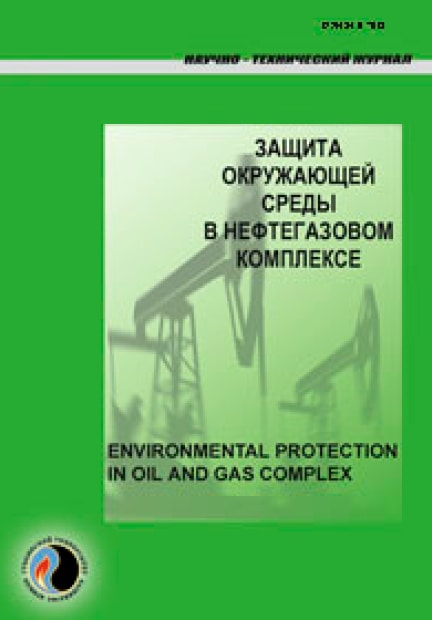Scientific and technical journal
«Environmental protection in oil and gas complex»
ISSN 2411-7013

Resource-saving technology of containers wastes disposal used for motor oil
UDC: 504.06
DOI: -
Authors:
1 Perm State Agrarian-Technological University named after academician D.N. Pryanishnikov, Perm, Russia
2 Perm National Research Polytechnic University, Perm, Russia
Keywords: containers for motor oil, recycling, asphalt concrete, biotesting, bitumen, geoecology, negative impact on the aquatic environment
Annotation:
Handling waste containers contaminated by engine oils creates increased risks of negative impact on aquatic environments. It is caused by the ability of engine oil, even in small quantities, to significantly influence the life-supporting resources of geospheric shells. Widely used technologies of such containers disposal require significant material and energy resources for cleaning containers from engine oil. It is proposed to use containers contaminated by engine oil as part of an asphalt concrete mixture used for roads construction. It is shown that the addition of engine oil (up to 3 %) to bitumen does not significantly change the properties of bitumen, which makes it possible to abandon the stage of cleaning containers from engine oil residues. The optimal composition of asphalt concrete with low-pressure polyethylene was established. A study of the geoecological safety of asphalt concrete, which included crushed containers contaminated by engine oil, showed no negative impact on aquatic environments. Reducing the water migration hazard of motor oil is achieved by forming a single structure with asphalt concrete bitumen.
Bibliography:
1. Sovershenstvovanie sistemy upravleniya otkhodami bureniya pri stroitel'stve skvazhin na sushe / E.I. Kompasenko, O.R. Kadyrov, E.A. Mazlova, O.S. Ostakh // Zashchita okruzhayushchey sredy v neftegazovom komplekse. – 2023. – № 1(310). – S. 33–41. – DOI: 10.33285/2411-7013-2023-1(310)-33-412. Mazlova E.A., Zaporozhskaya A.A., Morozova A.S. Komponenty neftekhimicheskoy produktsii v okruzhayushchey srede // Zashchita okruzhayushchey sredy v neftegazovom komplekse. – 2022. – № 6(309). – S. 23–29. – DOI: 10.33285/2411-7013-2022-6(309)-23-29
3. Functionalized Waste Plastic Granules to Enhance Sustainability of Bituminous Composites / S. Aldagari, S.F. Kabir, A. Lamanna, E.H. Fini // Resources, Conservation and Recycling. – 2022. – Vol. 183. – P. 106353. – DOI: 10.1016/j.resconrec.2022.106353
4. Molecular dynamics study on improvement effect of bis(2-hydroxyethyl) terephthalate on adhesive properties of asphalt-aggregate interface / Hongliang Zhang, Man Huang, Jun Hong [et al.] // Fuel. – 2021. – Vol. 285. – P. 119175. – DOI: 10.1016/j.fuel.2020.119175
5. Research on the phase structure of Styrene-Butadiene-Styrene modified asphalt based on molecular dynamics / Guannan Li, Zhaojun Gu, Yiqiu Tan [et al.] // Construction and Building Materials. – 2022. – Vol. 326. – P. 126933. – DOI: 10.1016/j.conbuildmat.2022.126933
6. Biocatalytic remediation of used motor oil-contaminated soil by fruit garbage enzymes / I.S. Bulai, H. Adamu, Y.A. Umar, A. Sabo // J. of Environmental Chemical Engineering. – 2021. – Vol. 9, Issue 4. – P. 105465. – DOI: 10.1016/j.jece.2021.105465
7. The Use of Polymer Materials in the Composition of Asphalt Concrete / K.G. Pugin, O.V. Yakontseva, V.K. Salakhova, A.M. Burgonutdinov // Materials Research Proceedings. – 2022. – Vol. 21. Int. conf. on modern trends in manufacturing technologies and equipment (ICMTMTE 2021), Sevastopol, Russia, Sep. 6–10, 2021. – P. 150–155. – DOI: 10.21741/9781644901755-27
8. Pugin K.G., Yakontseva O.V., Salakhova V.K. Ispol'zovanie polimernykh materialov v kachestve strukturnogo elementa v sostave asfal'tobetona // Transport. Transportnye sooruzheniya. Ekologiya. – 2021. – № 4. – S. 29–36. – DOI: 10.15593/24111678/2021.04.04
9. Pugin K.G., Pugina V.K. Ispol'zovanie otkhodov v strukture organomineral'nykh kompozitov, primenyaemykh dlya stroitel'stva avtomobil'nykh dorog // Transport. Transportnye sooruzheniya. Ekologiya. – 2021. – № 2. – S. 38–46. – DOI: 10.15593/24111678/2021.02.05
10. Usapein P., Chavalparit O. Options for sustainable industrial waste management toward zero landfill waste in a high-density polyethylene (HDPE) factory in Thailand // J. of Material Cycles and Waste Management. – 2014. – Vol. 16, Issue 2. – P. 373–383. – DOI: 10.1007/s10163-013-0198-6
11. Preparation, Characterization and Hot Storage Stability of Asphalt Modified by Waste Polyethylene Packaging / Changqing Fang, Ying Zhang, Qian Yu [et al.] // J. of Materials Science & Technology. – 2013. – Vol. 29, Issue 5. – P. 434–438. – DOI: 10.1016/j.jmst.2013.02.016
12. Saroufim E., Celauro C., Mistretta M.Ch. A simple interpretation of the effect of the polymer type on the properties of PMBs for road paving applications // Construction and Building Materials. – 2018. – Vol. 158. – P. 114–123. – DOI: 10.1016/j.conbuildmat.2017.10.034
13. Alghrafy Y.M., Abd Alla E.-S.M., El-Badawy S.M. Rheological properties and aging performance of sulfur extended asphalt modified with recycled polyethylene waste // Construction and Building Materials. – 2021. – Vol. 273. – P. 121771. – DOI: 10.1016/j.conbuildmat.2020.121771